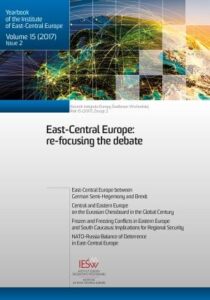Pages: 213-232
Edition: Lublin 2017
DOI: --
Citation method: B. Presas Mata, ‘Overcoming Divides in the Contemporary EU: “Connectivity”, Political Geography and Super Regions’, Yearbook of the Institute of East-Central Europe, Vol. 15, No. 2, 2017, pp. 213-232.
Abstract:
The objective of this paper is to examine the relationship between connectivity, considered how we make the most of geography, and nationalism, the long-lasting challenge that Europe has always faced. This paper considers that the process of integration in the European Union (EU) is no longer happening through nations, but through super regions—functionally connected entities that share key infrastructure, even when there is no clear geographical distinction. As these connections gain importance, nationalism decreases in strength. The first section provides an overview of nationalism in Europe, citing some current examples and relating it to the lack of a European identity. The second section defines the idea and extension of super regions and, using the core-periphery theory, explains “multi-speed” Europe. The next part will be devoted to the concept and implications of connectivity and the role of communication and data in cross-border flows. The last part draws a general picture of a Europe of super regions.
Bibliography:
Ágh, A., ‘The core-periphery divide in the EU transformation crisis: challenges to the Visegrád Four’, Yearbook of the Institute of East-Central Europe, Vol. 14, No. 2, 2016, pp. 113-130.
Anderson, M., States and nationalism in Europe since 1945, Routledge: New York, 2000.
Barber, T., ‘A renewed nationalism is stalking Europe’, Financial Times, July 11, 2016, https://www.ft.com/content/53fc4518-4520-11e6-9b66-0712b3873ae1 [2017-09-15].
Becas, J.L., Kavanag, W., Border encounters: Asymmetry and Proximity at Europe’s frontiers, New York: Berghahn, 2003.
Checkel, J.T., Katzenstein, P.J., European Identity, Cambridge: Cambridge University Press, 2009.
Coalition of Services Industries, ‘Cross-border data flows’, https://servicescoalition.org/services-issues/cross-border-data-flows [2017-09-15].
Commission of the European Communities, ‘White paper on a European communication policy’, 2006, http://europa.eu/documents/comm/white_papers/pdf/com2006_35_en.pdf [2017-09-15].
Delamaide, D., The new superregions of Europe, New York: Penguin Group, 1995.
Editorial team, ‘Europe’s rising far right: A guide to the most prominent parties’, The New York Times, 4 December 2016, https://www.nytimes.com/interactive/2016/world/europe/europe-far-right-political-parties-listy.html?_r=0 [2017-09-15].
European Commission, ‘White Paper on the future of Europe: Reflections and Scenarios for the EU27 by 2025’, 2017, http://eur-lex.europa.eu/legalcontent/EN/TXT/?uri=COM:2017:2025:FIN [2017-09-15].
European Commission, ‘Regional Policy’, Inforegio, http://ec.europa.eu/regional_policy/en/ [2017-09-15].
European Political Strategy Centre, ‘Enter the data economy: EU policies for a thriving data ecosystem’, Issue 21, 2017, https://ec.europa.eu/epsc/sites/epsc/files/strategic_note_issue_21.pdf [2017-09-15].
European Union Law, ‘Charter of fundamental rights of the European Union’, 2012, http://eur-lex.europa.eu/legal-content/EN/TXT/?uri=CELEX:12012P/TXT [2017-09-15].
Filιpowicz, M., ‘The idea of East-Central Europe and its role in shaping the logic behind Eastern Partnership’, Yearbook of the Institute of East-Central Europe, Vol. 14, No. 6, 2016, pp. 69-86.
Franke, M., ‘European Parliament/Communication policy’, 2017, http://www.europarl.europa.eu/atyourservice/en/displayFtu.html?ftuId=FTU_5.13.8.html [2017-09-15].
Gould, C.A., Messina, M.A., Europe’s contending identities, Cambridge: Cambridge University Press, 2014.
Gripaios, P., Mangles, T., ‘An analysis of European Super Regions’, Regional Studies, Vol. 27, No. 8, 1993, pp. 745-750, http://www.tandfonline.com/doi/pdf/10.1080/00343409312331347925 [2017-09-15].
Habermas, J., The Postnational Constellation and the Future of Democracy, Cambridge: MIT, 2001.
Khanna, P., Connectography, New York: Random House, 2016.
Kleger, H. New Regional Identities and Strategic Essentialism, Berlin: Transaction Publishers, 2007.
Krugman, P., ‘Increasing returns and economic geography’, Journal of Political Economy, Vol. 99, No. 3, 1993, https://www.princeton.edu/pr/pictures/gk/krugman/krugman-increasing_returns_1991.pdf [2017-09-15].
Lister, M., Pia, E., Citizenship in contemporary Europe, Edinburgh: Edinburgh University Press, 2008.
Lupel, A., ‘Regionalism and globalization: post-nation or extended nation?’, Polity, Vol. 36, No. 2, 2004, https://www.ipinst.org/images/pdfs/lupel_polity_jan2004.pdf [2017-09-15].
Manyija, J., Lund, S., Bughin, J., and others, ‘Digital globalization: the new era of global flows’, McKinsey Global Institute (MGI), 2016, http://www.mckinsey.com/business-functions/digital-mckinsey/our-insights/digitalglobalization-the-new-era-of-global-flows [2017-09-15].
Nesti, G., Public communication in the European Union: History, perspectives and challenges, Cambridge: Cambridge Scholars Publishing, 2010, http://www.cambridgescholars.com/download/sample/60110 [2017-09-15].
Philippe, M., Ottaviano, G., ‘The geography of multi-speed Europe’, Centre d’etudes prospectives et d’information internationales, No. 10, 1995, http://cepii.fr/PDF_PUB/wp/1995/wp1995-10.pdf [2017-09-15].
Raidio Teilifis Eireann (RTE), ‘EU’s Juncker lays out five pathways to unity’, 1 March 2017, https://www.rte.ie/news/analysis-and-comment/2017/0301/856453-eus-juncker-publishes-white-paper/ [2017-09-15].
Renan, E., What is a nation?, Conference delivered at the Sorbonne, 1882, http://ucparis.fr/files/9313/6549/9943/What_is_a_Nation.pdf [2017-09-15].
Rosamond, B., Theories of European integration, New York: MacMillan, 2000.
Schweiger, C., ‘The EU’s multiple cores and the CEEs: a threat or an opportunity?’, Yearbook of the Institute of East-Central Europe, Vol. 11, Issue 3, 2013, pp. 27-46.
Duchesne, S., ‘Social Gap: The Double Meaning of Overlooking’, in: Duchesne, S., Frazer, E., Haegel, F., van Ingelgom, V. (eds.), Citizens’ reactions to European integration compared, New York: MacMillan, 2013.
Woolf, S.J., Nationalism in Europe, 1815 to the present, Routledge: New York, 2002.
Zimmerman, H., Dür, A., Key controversies in European integration. London: MacMillan Education, 2012.

PDF: Download